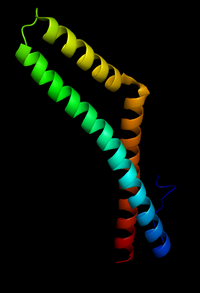
Photo from wikipedia
The stria vascularis (SV) contributes to cochlear homeostasis and consists of three layers, one of which contains the blood-labyrinthic barrier (BLB), with a large number of bovine cochlear pericytes (BCPs).… Click to show full abstract
The stria vascularis (SV) contributes to cochlear homeostasis and consists of three layers, one of which contains the blood-labyrinthic barrier (BLB), with a large number of bovine cochlear pericytes (BCPs). Cisplatin is a chemotherapeutic drug that can damage the SV and cause hearing loss. In this study, cell viability, proliferation rate, cytotoxicity and reactive oxygen species production were evaluated. The protein content of phospho-extracellular signal-regulated kinases (ERK) 1/2, total ERK 1/2, phospho-cytosolic phospholipase A2 (cPLA2), total cPLA2 and cyclooxygenase 2 (COX-2) and the release of prostaglandin E2 (PGE2) and vascular endothelial growth factor (VEGF) from BCPs were analyzed. Finally, the protective effect of platelet-derived growth factor (PDGF-BB) on BCPs treated with cisplatin was investigated. Cisplatin reduced viability and proliferation, activated ERK 1/2, cPLA2 and COX-2 expression and increased PGE2 and VEGF release; these effects were reversed by Dexamethasone. The presence of PDGF-BB during the treatment with cisplatin significantly increased the proliferation rate. No studies on cell regeneration in ear tissue evaluated the effect of the PDGF/Dex combination. The aim of this study was to investigate the effects of cisplatin on cochlear pericytes and propose new otoprotective agents aimed at preventing the reduction of their vitality and thus maintaining the BLB structure.
Journal Title: International Journal of Molecular Sciences
Year Published: 2022
Link to full text (if available)
Share on Social Media: Sign Up to like & get
recommendations!